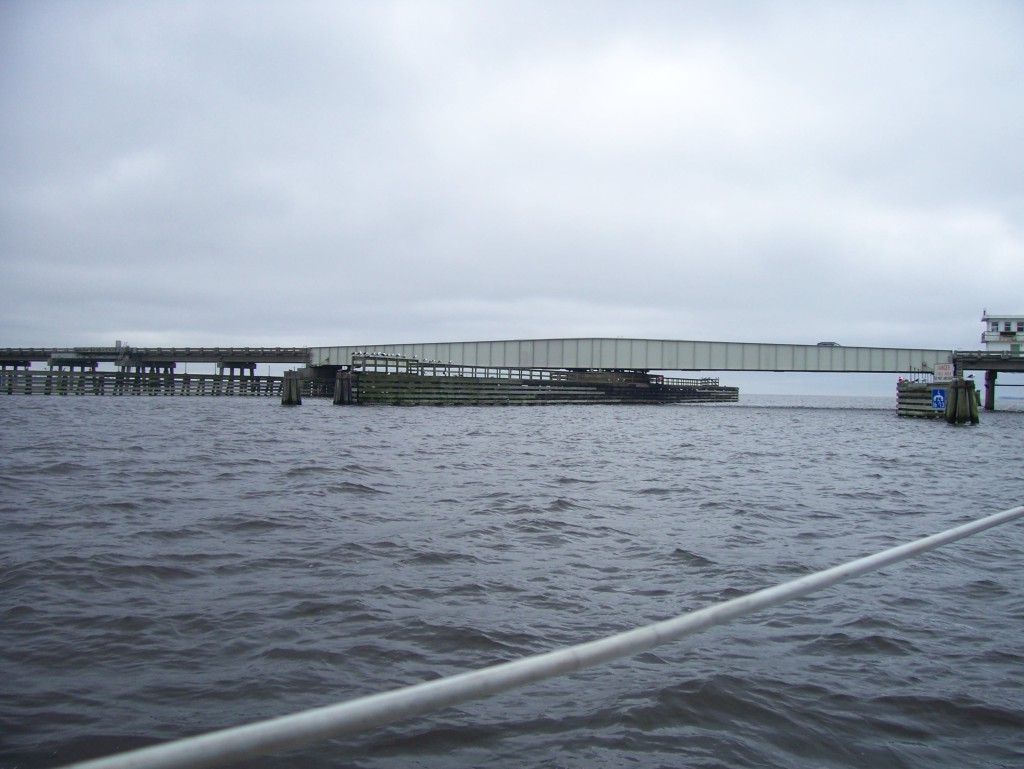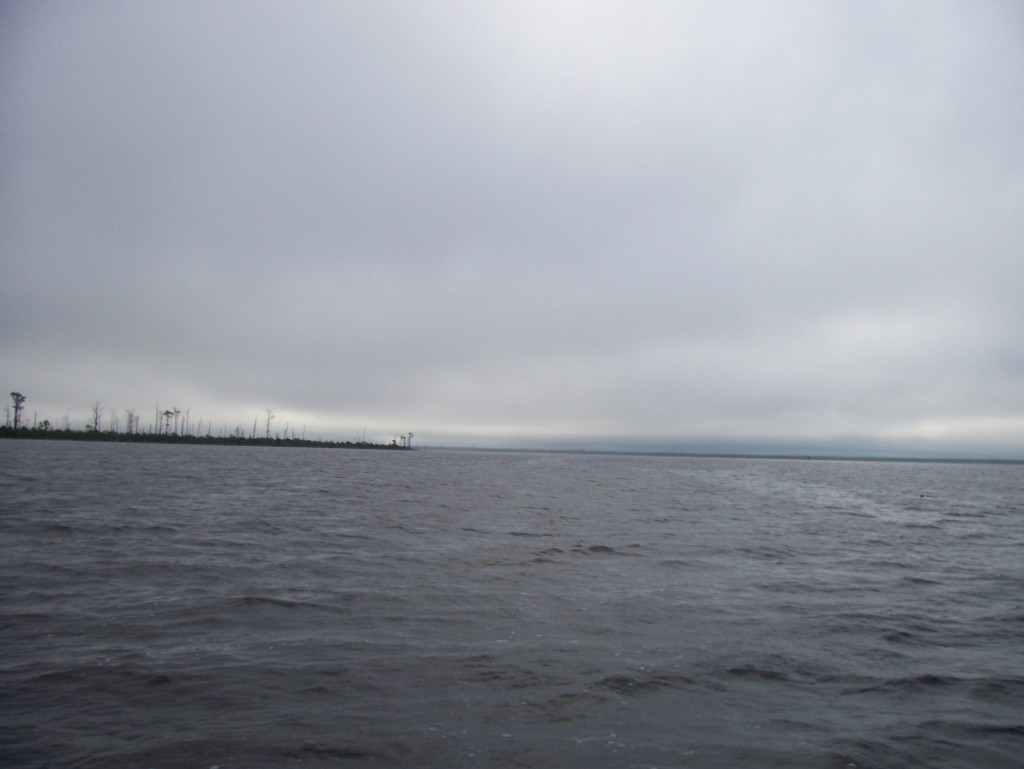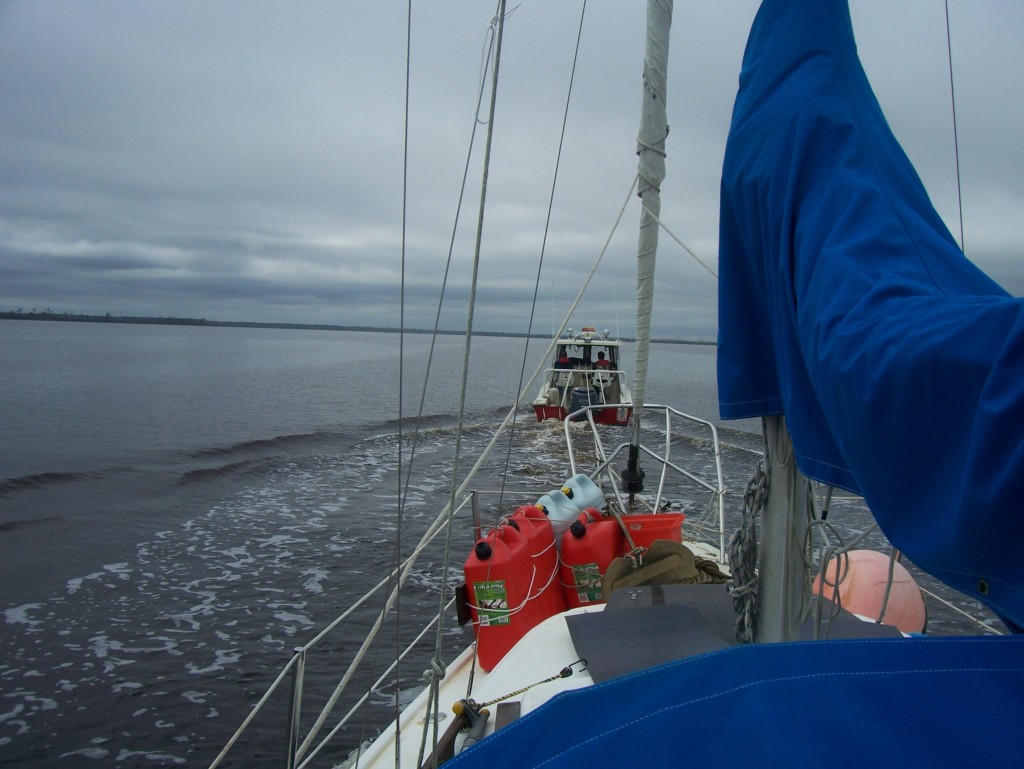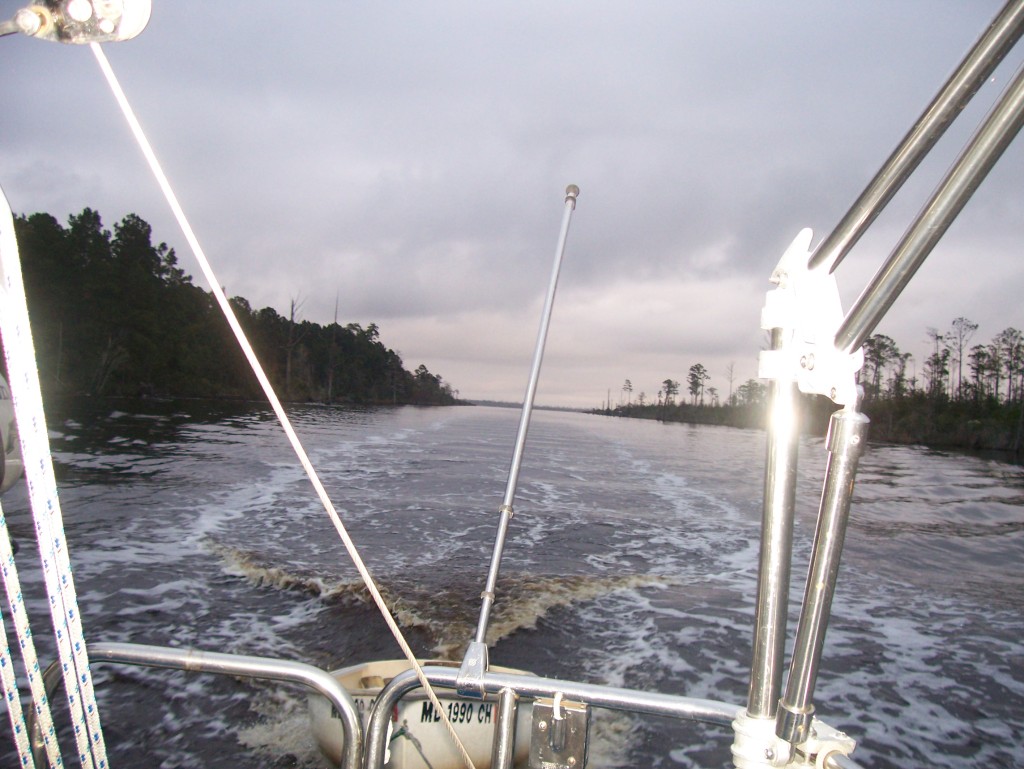We sailed across Albemarle Sound on Friday, jenny up and full of wind. The water was turbulent,waves choppy and relentless. It rained off and on, and we had solid gray skies all the way. We haven’t seen the sun since…. can’t remember! We motored up to the Alligator River Bridge and called the bridge tender. He ignored us. Half a mile later, he finally answered: “Stand by five or ten minutes, cap’n, til we finish greasin’ it.” Apparently, the swing bridge has to be greased before it can open.
I love the North Carolinian accent. Every native speaker sounds as though he is making a joke of it, doing imitations of Ron White – “ya cain’t fix stupid.” I had trouble understanding the bridge tender, but I imagine that goes both ways. Cinderella and Seneca finally caught up to us at the bridge and we crossed together.
Our anchorage Friday night was a little too rough to allow us to raft up, so we dropped the anchor on our own. Phil got out the grill and the last of the charcoal, and we grilled Italian veggie sausages. It was a dark night, no moon, with fully overcast skies. The anchorage was near the Alligator River Wildlife Refuge, so I listened for wolves. Zoo-born red wolves were re-introduced there, after a period of total extinction in the continental U.S. There are now estimated to be 60 wolves, but they were quiet that night.
Saturday: Skies are gray again on Saturday as we make early coffee and prepare to get underway. My optimistic outlook on weather – “I think it’s starting to get brighter!” – has become a running joke. It looks more like dusk than morning as Phil gets ready to pull the anchor and start the engine. Cinderella and Seneca pull theirs and head toward the Alligator River-Pungo River Canal, the 22-mile ditch we will take to Belhaven.
Have you ever had a car that wouldn’t start after it rained? It cranks up and never catches, just whirrs without a spark. Phil turns the key to start the engine, and Catmandu refuses to start up. To be precise, it’s not Catmandu who refuses to start, but the Atomic-4 gasoline engine that powers her. Our friends radio back and we send them on, sure it will fire up in just a minute.
An hour later, despite all of Phil’s tricks (and he has a lot of them), we are dead in the water. It’s time to call TowBoatUS. Meanwhile, Seneca is trying to raise us on the radio. He can’t hear our replies. Cell phone service is almost non-existent on the Alligator River. I have one bar on my cell service, and Phil has none at all. We send instant messages to Cinderella and Seneca, but they have no cell service either, and won’t get the messages until twelve hours later.
Throughout the long day of sailing here, and all the way down the Alligator River, I am struck by the lack of homes along the water. In New Hampshire, these long waterfront stretches would be dotted with summer cottages. Here, there is nothing but wilderness. There are no electric wires, no telephone wires and no cell phone towers. As far as we can see, it is Earth as she was created.
Phil has an app on his phone to call TowBoatUS, and it transmits our exact position. With the spotty cell service, he has to stand on the highest point of the boat to get a weak signal, but finally manages to talk to TowBoatUS long enough to get our call in. The connection doesn’t last, though, so we aren’t sure if they are coming. It is 9:30am. We are completely alone in the anchorage.
“Phil, if we take away everything man-made in this place, what would be different?” I ask, looking around at water, trees, birds, and the steel-gray sky.
“Catmandu would be gone,” he says. But that’s all.
An hour or so later, we get a radio call from the Coast Guard. “Sailing vessel Catmandu with a Phil Decker on board. This is the US Coast Guard.”
Phil answers, and they ask if we are in any distress. “No, we are safely at anchor.”
TowBoatUS had called the Coast Guard, to check on us. The call had gotten through and help was on the way. At around 11:30, we get a text message from TowBoatUS, but it didn’t make it through the cell phone hole. An hour later, Phil is on the computer balancing his checkbook and I look out the window to see a bright red boat approaching. “They’re here!” We are rescued.
Not so fast. After they put a bridle on Catmandu and drag her off the anchor, we notice their engine is cutting out. We are towed a total of no more than 200 yards and their engine quits altogether. “Fuel pump,” says J.W., a local man with that Ron White accent. His co-captain, Rich, drops an anchor and J.W. starts to take the outboard cover off. “I’m gonna need some tools,” he says.
“What kind of tools?” asks Rich, looking in the tow boat’s tool box. “We have screwdrivers, screwdrivers and screwdrivers.”
“I have tools,” says Phil.
“Do ya’ll have a 11mm socket wrench?”
Not only do we have the tools, we also have a spare fuel pump. After checking the old fuel pump, and determining that it can’t be repaired, J.W. takes a look at our spare pump. It won’t work. Both men are now on their cell phones, with the limited service, they call for friends to bring a fuel pump. No one seems to be around, or just are not answering.
“Let’s just call the police,” Rich says. “People usually answer the door for them.”
This is an advantage of living in a small town. They know many people with boats who can bring the part they need, and they know the police, who can knock on doors and raise someone to help us. It works. J.W. gets a call back and gives instructions for finding an outboard fuel pump, next to the trailer, in that old outboard with the hole in it.
Now that help is on the way, we four look at each other, all floating on two broken boats, hanging on to one small anchor.
“So,” J.W. says to me, “Whut’s fer supper?”
It was a joke, but it is five o’clock by the time a spare fuel pump arrives, and with Catmandu’s tools, J.W. installs it in the huge outboard. The older man who came on the second rescue boat says something unintelligible to us. He pulls out a fishing pole and casts a line into the water. I’m guessing he said, as long as I’m here, and my wife is in Greenville (I got that much), I might as well fish.
Anchor up, we make our way toward the entrance of the Alligator River-Pungo River canal at dusk. The towboat engine is running, but it sounds a little rough to me. It is dusk when we enter the narrow canal. We have a few anxious moments when a large tug and barge seem to be playing chicken with the towboat. It passes safely.
We see a great blue heron in a tree, and a few minutes later, a tree full of hawks or vultures in the dark. The moon comes out as we make our way down the dark waterway behind the towboat. We can only go about 6.5 knots, so it will take four hours to get to Belhaven. As phone service comes back to my phone, we try to find a boat mechanic at a marina that will take us. No luck.
Dowry Creek Marina – Paradise on the Pungo – can take us, but have no repair services. Phil decides he will try to fix the engine himself, so we arrive around 10pm as the towboat engine starts to hesitate and cut out. Our friends are there at the dock, along with Nick, the marina owner. Docking with no engine is nerve-wracking, and I’m shaking as I crawl up to the bow in the dark. It’s my job to release the towboat bridle and cast the bow line to Nick at the end of the dock. Thirty feet from the dock, the towboat engine quits.
There is enough momentum to make it, so I release the bridle and we float silently toward the dock. As soon as we are close enough, I toss the line and we are secured to the dock. The poor towboat manages to float in behind us, and they tie to the dock as well.
I have cash tips for these men who have been with us all day, suffering the same problems we are. “How are you going to get home?” I ask.
“Oh, I’m home now,” J.W. says. “I can call any number of old boys to come and get us here.” He hands back our 11mm socket wrench and wishes us luck. The towboat engine is running again, and we watch them pull away. J.W. is in back, pumping fuel by hand with a plastic bulb. I think they are the ones who need some luck.
Tuesday: Epilogue
We are still at Dowry Creek Marina, and boat repairs continue. We have had advice from Nick, from forums online, and on the phone from Moyer Marine, the gurus of the Atomic-4. The weather has been miserable. Rain, high winds, and more rain. Cinderella took advantage of one good day and headed south to Oriental. Their one message caused some excitement on Catmandu: “Dolphins!”
We talk endlessly about the engine. It cranks, it sounds healthy, but will not “catch.” We discuss the spark. It’s what we lack, and Catmandu needs it. We do test after test, following the spark. I update our many friends on Facebook: “Catmandu has lost her spark.”
Today, leaving the autoparts store on the third day of engine repairs, we are optimistic. The tests have revealed that perhaps, the points are not sparking as they should. We go to one auto parts store and they can order, but have no parts for us. A second store has the part we need. As we are leaving the parking lot, Phil looks up at the gray, drizzly sky.
“Looks like it’s getting brighter!” he says, and I laugh out loud.
Back at the boat, new points installed: Catmandu fires up. I am so happy to hear this engine, I text our friend Jean-Luc: “Do you hear that beautiful noise? It’s Catmandu!”
Phil is elated, understandably proud, and pours a little rum. Even the boat seems happy. Tomorrow, we will continue our journey. It is definitely looking brighter.





Kay, what a wonderful post. I can’t wait for Barb to read it. You are a trooper!
Its always brighter when the engines starts. Enjoy Oriental……
Hope one of those screwdrivers had vodka in it.
sounds so exciting. reminds me of the day ur boat had a hole in it. haha.